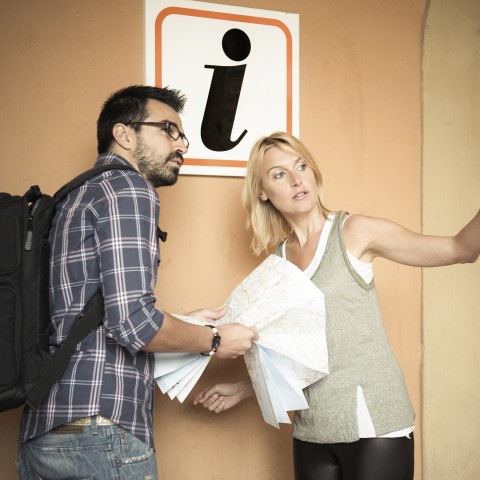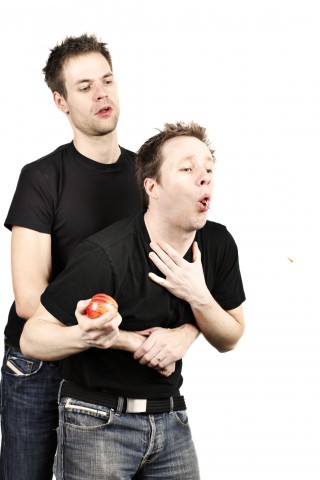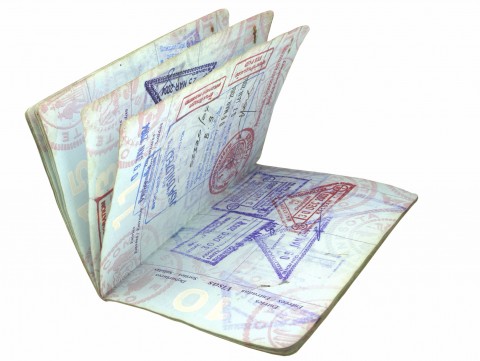
I always find traveling magical regardless of its purpose. Especially if I am going overseas. Will you also be going out of your country? Will you be traveling to Turkey? How exciting! You will end up in a new place in a few hours or the next day. You will see a place, which you haven’t seen before; which has a different lifestyle and traditions, which is full of people speaking another language. Ooops, when it comes to the language issue, you might feel uneasy. No worries. We will go over basic Turkish travel phrases in this article, so you can just concentrate on the experiences you will have and new things you will add to your own world. Who knows; maybe you will have new connections. I wish you a nice trip where you will have new, good memories you can look back at years later with a big smile.

 Table of Contents
Table of Contents
- Basic Turkish Travel Phrases
- Transportation
- Shopping
- Hotels
- Restaurants
- Asking for and giving directions
- In case of an emergency
- Phrases to overcome language barriers
- Learn More with TurkishClass101!
1. Basic Turkish Travel Phrases
1 – Greetings
Whether you are stepping into a meeting room, a hotel or a shop, or a school, a warm and sincere greeting will open the doors for you! It will help you make a good first impression and communicate effectively.
Here are some greeting words in Turkish you can use to build connection with Turkish people:
| Turkish | English |
| Merhaba | “Hello” |
| Selam | “Hi” |
| İyi günler | “Good day” |
| Günaydın | “Good morning” |
| Tünaydın | “Good afternoon” |
| İyi akşamlar | “Good evening” |
| İyi geceler | “Good night” |
| Baybay | “Bye bye” |
| Hoşçakalın | “Good-bye” |
Make sure to check this link to learn more greeting words in Turkish. You can also refer to our article if you’d like to know how you can introduce yourself in Turkish.
2 – Courtesy phrases
Kind and good words always impress people. Someone asking for help or asking a question in a kind way usually gets an answer also in a kind way. Therefore, it’s a good idea to learn these useful Turkish courtesy phrases while you are traveling.
| Turkish | English |
| Teşekkür ederim. | “Thank you.” |
| Teşekkürler. | “Thanks.” |
| Bir şey değil. / Rica ederim. | “You’re welcome.” |
| Lütfen. | “Please.” |
| Problem/sorun değil. | “No problem.” |
| Afedersiniz. | “Excuse me.” |
| Üzgünüm. | “I’m sorry.” |
3 – Likes/Dislikes
If you are in Turkey traveling, you might also need to express your likes and dislikes.
Severim/sevmem // Beğenirim/beğenmem – “I like/I don’t like”
Let’s see how we can use these Turkish words in sentences:
| Turkish | English | |
| 1 | Hayvanları çok severim. | “I like animals a lot.” |
| 2 | Acı sosları hiç sevmem. | “I don’t like hot sauces at all.” |
| 3 | Türkçe öğrenmeyi seviyorum. | “I like learning Turkish.” |
| 4 | Araba kullanmayı sevmiyorum. | “I don’t like driving.” |
| 5 | O kravatı beğenmedim. | “I didn’t like that tie.” |
2. Transportation
If you are traveling in Turkey, you will need different means of transport to get around. You might also need other information such as timetables, ticket, station, drop off point information etc.
Now, let’s take a look at some Turkish travel phrases that cover transportation:
1 – How to get to your destination
In order to get to your destination, you should know the vehicle names in Turkish.
Here they are:
| Turkish | English |
| Araba | “Car” |
| Otobüs | “Bus” |
| Uçak | “Plane” |
| Taksi/taxi | “Taxi” |
| Tren | “Train” |
| Metro | “Subway” |
| Tramvay | “Tram” |

2 – What is your destination?
Below are some phrases you can use to talk or inquire about your destination:
| Turkish | English |
| Havaalanına gitmek istiyorum. | “I’d like to go to the airport.” |
| Otobüs durağı nerede? | “Where is the bus stop?” |
| Bana bir taksi çağırabilir misiniz? | “Could you call a taxi for me?” |
| En yakın metro/tren istasyonu nerede? | “Where is the closest subway/train station?” |
| Buradan Taksim’e tramvay ile gidebilir miyim? | “Can I go to Taksim by tram from here?” |
3 – How to buy a ticket?
You should be able to ask the right questions to get a ticket. Let’s take a look at the following common Turkish phrases:
| Turkish | English |
| Gidiş bileti | “One way ticket” |
| Gidiş dönüş bileti | “Round trip ticket” |
| Nereden bilet alabilirim? | “Where can I buy a ticket?” |
| İzmir uçağı saati kaçta? | “What time is the flight to Izmir?” |
| İstanbul’a bilet ne kadar? | “How much is the ticket to Istanbul?” |
4 – Other information
A few different transport related situations are covered above. Now, let’s take a look at a few more phrases you might require as you are moving around:
| Turkish | English |
| İyi yolculuklar! | “Have a good trip!” |
| Bu otobüs Optimum alışveriş merkezinden geçer mi? | “Does this bus pass by the Optimum mall?” |
| İzmir İstanbul arası otobüsle kaç saat sürer? | “How long does it take from Izmir to Istanbul by bus?” |
| Fenerbahçe’ye gitmek için hangi otobüse binmeliyim? | “Which bus should I take to go to Fenerbahçe?” |
3. Shopping
If you are traveling, knowing some shopping vocabulary will be definitely useful. If you are going to a supermarket for a bottle of water, or to a mall to buy a raincoat, or to a shop for a souvenir, or to a drugstore for a painkiller, the following information will be handy for sure:
| Turkish | English |
| Bu kaç beden? | “What size is this?” |
| Bu ne kadar? | “How much is this?” |
| Bunu almak istiyorum. | “I’d like to buy this.” |
| Bana biraz indirim yapar mısınız? | “Can you give me a discount?” |
| Kredi kartı ile ödeyebilir miyim? | “Can I pay by credit card?” |
It’s really a good idea to know numbers in Turkish as well, if you are shopping. Make sure to read our article about numbers.
4. Hotels
Accommodation is another important factor when you are traveling. In Turkey, you can find hotels with different star ratings (from one to seven stars), pensions, vacation rentals etc. based on your budget. The following Turkish phrases for travelers relevant to accommodation will give you a relief when trying to find a place to stay.
| Turkish | English |
| Boş odanız var mı? | “Do you have an available room?” |
| Geceliği ne kadar? | “How much is it per night?” |
| Kahvaltı dahil mi? | “Is breakfast included?” |
| Kahvaltı saat kaçta? | “At what time is breakfast?” |
| Odayı kaçta boşaltmam gerekiyor? | “What time do I have to leave the room?” |
5. Restaurants
Oh, no, if you are in Turkey, you can’t just stay in a hotel room and order room service. There are so many different tastes outside the hotel. You should get out of the hotel and discover Turkish food, absolutely new tastes!
If you have not heard about Turkish cuisine, yet, make sure to read our article before you decide on a menu.
Get ready for your meal with the help of the following phrases:
| Turkish | English |
| Menüyü alabilir miyim? | “May I have the menu?” |
| Ne önerirsiniz? | “What would you recommend?” |
| Ben vejeteryanım. | “I’m a vegetarian.” |
| Süte alerjim var. | “I’m allergic to milk.” |
| Hesap lütfen! | “Check, please!” |

6. Asking for and giving directions
Asking directions is an inevitable part of a trip. You are in a new place and don’t know your way around. Of course, there will be times you will need directions.
Here are how you can ask where you want to go and some answers that will let you know the directions to your destination:
| Turkish | English |
| Taksim’e gitmek istiyorum. | “I’d like to go to Taksim.” |
| Taksim’e nasıl gidebilirim? | “How can I go to Taksim?” |
| Afedersiniz, kütüphane nerede? | “Excuse me, where is the library?” |
| 300 metre ileride sağda. | “It’s 300 meters ahead on the right.” |
| Düz gidin sağdan 2. sokağa dönün. | “Go straight, turn right onto 2nd street.” |
| Köşeden sola dönün, 4. bina. | “Turn left at the corner, it’s the 4th building.” |

7. In case of an emergency
This is an important topic you should make a note of. None of us know what’s going to happen in the next second. We can find ourselves in a dangerous situation all of a sudden and need help. I hope you will never need to use the following, but God forbids, if any emergency comes up, you can refer to the indicated phrases:
| Turkish | English |
| Bana yardım edin lütfen! | “Help me please!” |
| Polisi arayın lütfen. | “Please call the police.” |
| Ambulans çağırın. | “Call an ambulance.” |
| Ben kayboldum. Bana yardım edebilir misiniz? | “I’m lost. Can you help me?” |
| Hastane nerede? | “Where is the hospital?” |
| Pasaportumu/cüzdanımı kaybettim. Yardıma ihtiyacım var. | “I lost my passport/wallet. I need help.” |

He needs help!
8. Phrases to overcome language barriers
If you are traveling to/within a foreign country, even if you have a dictionary or if you have learnt some phrases in that language, it’s very possible that there will be times when you will have difficulty expressing yourself or understanding the native speaker. Here are some Turkish phrases for tourists that can help you overcome the language barriers:
| Turkish | English |
| Anlamadım. | “I didn’t understand.” |
| İngilizce konuşuyor musunuz? | “Do you speak English?” |
| Yavaş konuşabilir misiniz lütfen? | “Can you speak slowly please?” |
| Buraya yazabilir misiniz? | “Can you write it here?” |
| Türkçe de “___” nasıl diyorsunuz? | “How do you say ‘___’ in Turkish?” |
9. Learn More with TurkishClass101!
In this article, you learned quite a number of must-know Turkish travel words and phrases. However, there are a lot more Turkish phrases for travel!
Therefore, visit TurkishClass101.com, which has numerous audio recordings, tons of vocabulary lists and free resources including the dictionary you can refer to, in order to learn basic Turkish and to get a better grasp of the culture.
Don’t forget that there is also MyTeacher, which is the premium service of TurkishClass101 that you can use to practice with a private teacher.
Do you know what is also good about it? You can download the app for free and use it wherever you are.
Last but not the least; please continue to provide us feedback about all the resources provided at TurkishClass101!

Let’s Learn Turkish Numbers

Can you imagine carrying out a conversation in a foreign language without knowing the numbers in that language? I seriously can’t! We deal with numbers in every aspect of our lives. They are not only used in counting, but also when telling the date and the time, dimensions, weight, temperature, distances, prices, your age, phone number, address, and even blood pressure. In short, since they have a wide range of usage from math to history, geography to science, medicine to seismology, it’s impossible to have proper conversations without knowing numbers!
Are you ready to learnTurkish numbers and their usage?

 Table of Contents
Table of Contents
- Basic vocabulary related to numbers
- How to count from 0 to 9?
- How to count from 10 to 100
- Numbers up to Thousand and Beyond
- How to say your age
- How to give your phone number
- How to use numbers when saying prices
- How to use numbers when shopping
- Other usages of numbers
- Discover More About the Turkish Language on TurkishClass101.com
1. Basic vocabulary related to numbers
Let’s start with some vocabulary related to numbers and then we can count and see how Turkish numbers are used in different areas.
| Turkish | English |
| Sayı/Sayılar | Number/Numbers |
| Tam sayılar | Whole numbers |
| Kesirli sayılar | Rational numbers |
| Sıra sayısı | Ordinal number |
| Ondalık sayı | Decimal number |
| Basamak | Digit |
| Pi sayısı | Pi |
| Tam | Whole |
| Yarım/Buçuk | Half |
| Çeyrek | Quarter |
| Saymak | To count |
| Hesaplamak | To calculate |
| Kaça/Kaç para/Ne kadar? | How much? |
| Kaç/Kaç tane? | How many? |
2. How to count from 0 to 9?
| Number | Turkish |
| 0 | Sıfır |
| 1 | Bir |
| 2 | İki |
| 3 | Üç |
| 4 | Dört |
| 5 | Beş |
| 6 | Altı |
| 7 | Yedi |
| 8 | Sekiz |
| 9 | Dokuz |
In Turkish, when a noun is preceded by a number greater than one, the noun does not take the plural suffix, -lar or -ler. Instead, it retains its singular form because the number indicates that it’s plural.
Example:
- Bıçak – “Knife”
- Bir bıçak – “One knife”
- Yedi bıçak – “Seven knives”
3. How to count from 10 to 100
A- Teens
| Number | Turkish |
| 11 | On bir |
| 12 | On iki |
| 13 | On üç |
| 14 | On dört |
| 15 | On beş |
| 16 | On altı |
| 17 | On yedi |
| 18 | On sekiz |
| 19 | On dokuz |
B- Tens
| Number | Turkish |
| 10 | On |
| 20 | Yirmi |
| 30 | Otuz |
| 40 | Kırk |
| 50 | Elli |
| 60 | Altmış |
| 70 | Yetmiş |
| 80 | Seksen |
| 90 | Doksan |
Let’s take a look at some examples:
· 12: On iki
· 21: Yirmi bir
· 34: Otuz dört
· 43: Kırk üç
· 56: Elli altı
· 65: Altmış beş
· 78: Yetmiş sekiz
· 87: Seksen yedi
· 99: Doksan dokuz
4. Numbers up to Thousand and Beyond
Now that you learned the Turkish numbers 1-100, let’s continue with larger numbers.
A- Hundreds
In Turkish, if the 3-digit number starts with a “one”, you never say “one hundred”; you just say “yüz”, meaning “hundred.” To form the numbers from 200 to 900, all you need to do is to place a number from 2-9 in front of the word “yüz”, which is “hundred” in English.
| Number | Turkish |
| 100 | Yüz |
| 200 | İki yüz |
| 300 | Üç yüz |
| 400 | Dört yüz |
| 500 | Beş yüz |
| 600 | Altı yüz |
| 700 | Yedi yüz |
| 800 | Sekiz yüz |
| 900 | Dokuz yüz |
Here are some examples for you:
· 127: Yüz yirmi yedi
· 256: İki yüz elli altı
· 334: Üç yüz otuz dört
· 468: Dört yüz altmış sekiz
· 541: Beş yüz kırk bir
· 679: Altı yüz yetmiş dokuz
· 715: Yedi yüz on beş
· 893: Sekiz yüz doksan üç
· 922: Dokuz yüz yirmi iki
B- Thousands
The thousands work the same way. In Turkish, if the 4-digit number starts with a “one”, you never say “one thousand”; you just say “bin”, meaning “thousand.” To form the numbers from two thousand to nine thousand, all you need to do is to place a number from 2-9 in front of the word “bin”, which is “thousand” in English.
Please also note that whole numbers are separated with a “dot” and decimal numbers with a “comma” in Turkish.
Examples:
· 1.000 – Bin (“1,000 – One thousand”)
· 1,50 – Bir buçuk (“1.5 – One point five”)
Numbers in Turkish | Turkish |
| 1.000 | Bin |
| 2.000 | İki bin |
| 3.000 | Üç bin |
| 4.000 | Dört bin |
| 5.000 | Beş bin |
| 6.000 | Altı bin |
| 7.000 | Yedi bin |
| 8.000 | Sekiz bin |
| 9.000 | Dokuz bin |
Below are some examples:
· 1561: Bin beş yüz altmış bir
· 2352: İki bin üç yüz elli iki
· 3843: Üç bin sekiz yüz kırk üç
· 4124: Dört bin yüz yirmi dört
· 5675: Beş bin altı yüz yetmiş beş
· 6496: Altı bin dört yüz doksan altı
· 7787: Yedi bin yedi yüz seksen yedi
· 8938: Sekiz bin dokuz yüz otuz sekiz
· 9019: Dokuz bin on dokuz
C- Beyond One Thousand
Here are some numbers with many zeros:
Numbers in Turkish | Turkish |
| 10.000 | On bin |
| 100.000 | Yüz bin |
| 1.000.000 | Bir milyon |
| 1.000.000.000 | Bir milyar |
| 1.000.000.000.000 | Bir trilyon |
| 1.000.000.000.000.000 | Bir katrilyon |
5. How to say your age
Saying your age is one of the basic information you provide when you introduce yourself.
As in some other countries, it is considered as private and sensitive information by some women in Turkey. Therefore, I recommend you to be careful when asking women about their ages in Turkey.
Q: Kaç yaşındasınız? (“How old are you?”) (Formal)
A: Kırk bir yaşındayım. (“I’m forty-one years old.”) (Literally: I’m in the age of forty-one.)
Q: Kaç yaşındasın? (“How old are you?”) (Informal)
A: Kaç gösteriyorum? (“How old do I look?”)
Q: Otuz altı. (“Thirty-six.”)
A: Teşekkürler, aslında elli yaşındayım. (“Thanks, actually I am fifty years old.”)

6. How to give your phone number
When you dial a phone number within Turkey, you first dial a “zero” and then either the 3-digit code of the city if you are calling a landline or the 3-digit code of the mobile phone provider. Then you dial the 7-digit number. If you are trying to call a Turkish number out of Turkey, then you should first dial the country code,”90” for Turkey and then the whole number (10 digits) without dialing the “0.”
Ex:
0-532-777-77 77 (Within Turkey)
90-532-777-77 77 (Outside of Turkey)
Formal ways of asking a phone number:
· Telefon numaranızı alabilir miyim? (“May I have your phone number?”)
· Telefon numaranızı sorabilir miyim? (“May I ask your phone number?”)
· Telefon numaranızı verebilir misiniz? (“Can you give your phone number?”)
· Telefon numaranızı söyleyebilir misiniz? (“Can you tell your phone number?”)
Let’s say our mobile number is: 0-532- 395- 56 56
Some people will say the zero, some won’t. Here are the two ways you can read it:
· Sıfır, beş yüz otuz iki, üç yüz doksan beş elli altı elli altı. (“Zero, five hundred thirty two, three hundred ninety five, fifty six, fifty six.”)
· Beş yüz otuz iki, üç yüz doksan beş elli altı elli altı. (“Five hundred thirty two, three hundred ninety five, fifty six, fifty six.”)
Informal ways of asking a phone number:
· Cep numaran kaç? (“What is your mobile number?”)
· Telefon/cep numaranı alabilir miyim? (“May I have your phone/mobile number?”)
· Telefon/cep numaranı sorabilir miyim? (“May I ask your phone/mobile number?”)
· Telefon/cep numaranı verebilir misin? (“Can you give your phone/mobile number?”)
· Telefon/cep numaranı söyler misin? (“Can you tell your phone/mobile number?”)
Let’s say our mobile number is: 0-542-666-66 66
Here are the two ways you can read it:
· Sıfır, beş yüz kırk iki, altı yüz altmış altı, altmış altı, altmış altı. (“Zero, five hundred forty-two, six hundred sixty six, sixty six, sixty six.”)
· Beş yüz kırk iki, altı yüz altmış altı, altmış altı, altmış altı. (“Five hundred forty-two, six hundred sixty six, sixty six, sixty six.”)

You can click here to check Turkish phone words and phrases.
7. How to use numbers when saying prices
If you are living in Turkey or visiting Turkey, in any case, you will be buying something; be it a pack of gum or a gift for your beloved one. Let’s see how you can use Turkish numbers when talking about prices.
Q: Bu elbise ne kadar? (“How much is this dress?”)
A: İki yüz kırk lira. (“Two hundred forty liras.”)
Q: İki yüz lira olur mu? (“Would it be two hundred liras?”)
A: Maalesef olmaz. (“Unfortunately, no.”)
As you may guess from the example, you might try negotiating in some stores in Turkey.
Q: Peynirin kilosu ne kadar? (“How much is a kilo of cheese?”)
A:Seksen beş lira elli kuruş. (“Eighty-five lira fifty cents.”)

8. How to use numbers when shopping
Below are some examples that will show you how you can use Turkish numbers as quantities when shopping:
· Bir kutu süt istiyorum. (“I’d like a box of milk.”)
· İki yüz elli gram peynir almak istiyorum. (“I’d like to buy 250 grams of cheese.”)
· Yarım kg et alacağım. (“I will buy half a kilo of meat.”)
· İki şişe su rica edeyim. (“Two bottles of water, please.”)
· Beş paket sigara istiyorum. (“I’d like five packs of cigarrettes.”)
9. Other usages of numbers
Now, let’s see how else we can use numbers:
A- Percentage
In Turkish, the way percentages are written and read are different than English. Percentage sign is written and read before the number. Here are some examples:
· %50 – Yüzde elli (“50% -“Fifty percent”)
· %82 – Yüzde seksen iki (“82% – “Eighty two”)
B- Weather
Turkey uses Celsius scale. Only the degree is pronounced. Celsius is not mentioned when talking about the degrees.
· Bugün hava kaç derece? (“What is the temperature today?”)
· 30o – Otuz derece (“Thirty degrees”)
C- Dimensions
Turkey uses the metric system and below is an example showing how to say dimensions in Turkish:
· En otuz cm, boy elli iki cm, yükseklik otuz dört cm. (“Width thirty cm, length fifty-two cm, height thirty four cm.”)
D- Weight
Here are some examples for your reference:”
· 70,5 kg – Yetmiş buçuk kg (“70.5 kg”)
· 1200 gr – Bin iki yüz gr (“1200 gr”)
· 136,5 ton – Yüz otuz altı buçuk ton (“136.5 tons”)
I’d like to point out once again that commas are used to show the decimal places in Turkish.

10. Discover More About the Turkish Language on TurkishClass101.com
You’ve now learnt a lot about Turkish numbers, the Turkish number system, and the Turkish numbers’ pronunciation. You have also learnt how to count Turkish numbers 1-1000 and how to use them in different cases.
Best way to learn Turkish numbers in-depth is to check TurkishClass101, which has numerous audio recordings, tons of vocabulary lists and free resources including the dictionary you can refer to, in order to get a better grasp of Turkish language and the culture.
Don’t forget that there is also MyTeacher, which is the premium service of TurkishClass101 that you can use to practice 1-on-1 with a private teacher.
Do you know what is also good about it? You can download the app for free and use it wherever you are.
Last but not the least; please continue to provide us feedback about all the resources provided at TurkishClass101!

How to Say Sorry in Turkish
Learn how to apologize in Turkish – fast and accurately! TurkishClass101 makes it easy for you to make amends. Start with a bonus, and download your FREE cheat sheet – How to Improve Your Turkish Skills! (Logged-In Member Only)

Table of Contents
- Common Ways to Say Sorry in Turkish
- How To Refuse Something Politely in Turkish
- Audio Lesson – Survival Phrases “How to Say Sorry”
- Why You Will NOT Be Sorry For Learning Turkish through TurkishClass101
1. Common Ways to Say Sorry in Turkish
Nobody’s perfect, not anywhere in the world. Everybody makes mistakes, and does and says regrettable things. Then it’s time to apologize, as saying ‘I’m sorry’ is not in vain. It can be very healing! Did you know that hearing a sincerely-meant apology can have a noticeable effect on a person’s body? Research has shown that it slows down breathing and heart rate, and even causes a drop in blood pressure.
Sometimes we cannot fix what’s broken, but we can make the experience a bit easier for anyone who suffered on account of our thoughtless actions or words.
Here are a number of ways to say sorry in Turkish. In any language, just make sure you really mean it! An insincere apology will not go down well with anyone.
Özür dilerim.
I’m sorry
These words should precede anything else you have to say. Use them sincerely and whenever you are clearly in the wrong. Acknowledging your guilt and apologizing for any wrongdoing will lift your spirits too! Often, remorse can eat away at us, and a simple ‘I’m sorry’, in Turkish or any other language, can open the door for forgiveness and resolution of a bad situation. It can be a true gift!
Özür dilemek isterim.
I would like to apologize.
This is a slightly more formal way to say ‘I’m sorry’ in Turkish. Use this phrase if you’re addressing your superiors and/or elders.
Tüm samimiyetimle özür dilerim.
I sincerely apologize.
If you feel strongly about your apology, this is another slightly more formal phrase to use. Keep it handy for graver errors, or you might come across as insincere!
Tekrar yapmayacağım.
I won’t do it again.
A promise you can only make if you intend to keep it! Few things feel as bad as having to hear repeated apologies from someone for the same behavior – it means the ‘sorry’ is not sincere. Don’t be that person!
Bu hatayı tekrar yapmamaya dikkat edeceğim.
I’ll make sure not to make this mistake again.
A beautifully strong phrase! Again, say this only if you mean it – not just in the moment, but always! A bit more formal, this is an especially good phrase to use when apologizing to superiors and/or elders. It will make an especially good impression at the workplace, where accountability is an excellent quality to display!
Onu demek istemedim.
I didn’t mean that.
This is a tricky one… What did you mean, then?! Clear up any confusion with sincerity. Also, use this phrase only if the harm done or mistake made was due to an accident, and then admit to thoughtlessness on your part, if appropriate.
Bu benim hatam.
It’s my fault.
If the fault is really yours, own up to it. You will gain respect in the eyes of others! However, don’t take the blame when it’s not truly yours. It won’t be good for you, and ultimately you will not be respected much for it.
Bencillik yaptığım için üzgünüm.
I’m sorry for being selfish.
This is a good phrase to keep handy, especially for your close relationships. It is difficult to admit you’re selfish, isn’t it?! However, it’s good to know when to be honest. We get used to our loved ones, which often means we forget that they need our good manners and unselfish behavior just as much as strangers do.
Umarım beni affedersin.
I hope you will forgive me.
This is a polite and gentle wish that can smooth over many harsh feelings. It also shows that the other person’s opinion and forgiveness are important to you.
Tüm sorumluluğu üstüme alıyorum.
I take full responsibility.
This strong statement is similar to admitting that an error or transgression was your fault. It speaks of courage and the willingness to take remedial action. Good one to use…if you mean it!
Bunu yapmamalıydım.
I shouldn’t have done it.
This phrase is fine to use if you did or said something wrong. It shows, to an extent, your regret for having done or said what you did, and demonstrates that you understand your role in the mistake.
Paranızı geç geri verdiğim için özür dilerim.
Sorry for giving your money back late.
It’s rotten to have to loan money! Yet, it’s equally rotten to have to ask for the repayment of a loan. So, do your best not to pay late in the first place, but if it can’t be helped, this would be a good phrase to use!
Lütfen bana kızma.
Please don’t be mad at me.
Well, this is not a very advisable phrase to use if you are clearly in the wrong. If someone is justifiably angry with you, asking them not to be mad at you would be an unfair expectation. However, if you did something wrong by accident, and if the consequences were not too serious, this request would be OK.
Üzgünüm geciktim.
Sorry I’m late.
Punctuality is valued in most situations, but if you really cannot help being late, then apologize! This way you show respect for your host, and win their approval.
Sana kötü davrandığım için özür dilerim.
I apologize for being mean to you.
Acknowledging your own meanness towards someone is no small thing, so good for you! Use this apology only if your intention is to seriously address your mean tendencies, or these words could become meaningless over time.
2. How To Refuse Something Politely in Turkish
Congratulations! Now you know how to apologize in Turkish! After you have apologized for a mistake, focus on fixing whatever you can, and don’t punish yourself over something that cannot be taken back or reversed. That’s healthy for you! Regret can eat away at the soul, and even destroy it. It is ultimately a useless emotion if it consumes you.
However, in language, we use apologies not only when we’ve transgressed or made mistakes. They come in handy in other situations too, when there has been no wrongdoing. Sometimes we need to express regret for having to refuse a gift, an offer, or an invitation. This can be somewhat tricky. Learn from specialists at TurkishClass101 about how to use the correct Turkish words for this kind of ‘sorry’!
3. Survival Phrases “How to Say Sorry”
On the run and need a quick lesson on how to say sorry in Turkish? Don’t fret, just listen and repeat! Click here for a recorded short lesson and learn how to give the perfect apology, with perfect pronunciation in Turkish. A little can go a long way, and you will sound like a native!
4. Why You Will NOT Be Sorry For Learning Turkish through TurkishClass101
Online learning is here to stay, that’s a fact. In 2015, the Digital Learning Compass Partnership released a report based on surveys to determine online enrollment trends in US institutions for higher education. Thirty percent of all their students learned online! And the number is growing! However, how can you be sure you will not regret your choice of an online language learning school? First, look at the school’s credentials and what it has to offer…
- Fun and Easy Learning: It’s a commonly-known fact that when learning is made easy and fun, student motivation rises. And as motivation rises, so does the effort to learn – what a beautiful cycle! TurkishClass101’s language learning system is designed to get you speaking from the onset. Learn at your own convenience and pace with our short, effective and fun audio podcast lessons. Our Learning Center is comprehensive and state-of-the-art, with a vibrant user community to connect to! Our lessons are recorded with native hosts and voice actors, providing a diverse range of dialects in your lessons. You can be confident that native speakers will understand you when speaking Turkish!
- Innovative Learning Tools and Apps: We make it our priority to offer you the best learning tools! These include apps for iPhone, iPad, Android and Mac OSX; eBooks for Kindle, Nook, and iPad; audiobooks; Roku TV and so many more. This means that we took diverse lifestyles into account when we developed our courses, so you can learn anywhere, anytime on a device of your choice. How innovative!
- Free Resources: Sharing is caring, and for this reason, we share many free resources with our students. For instance, start learning Turkish with our basic online course by creating a lifetime account – for free! Also get free daily and iTunes lessons, free eBooks, free mobile apps, and free access to our blog and online community. Or how about free Vocabulary Lists? The Turkish dictionary is for exclusive use by our students, also for free. There’s so much to love about TurkishClass101…!
- Live Hosts and One-on-One Learning: Knowledgeable, energetic hosts present recorded video lessons, and are available for live teaching experiences if you upgrade. This means that in the videos, you get to watch them pronounce those tongue-twisters, as if you’re learning live! Add octane to your learning by upgrading to Premium Plus, and learn two times faster. Your can have your very own Turkish teacher always with you, ensuring that you learn what you need, when you need to – what a wonderful opportunity to master a new language in record time!
- Start Where You Are: You don’t know a single Turkish word? Not to worry, we’ve absolutely got this. Simply enroll in our Absolute Beginner Pathway and start speaking from Lesson 1! As your learning progresses, you can enroll in other pathways to match your Turkish level, at your own pace, in your own time, in your own place!
After this lesson, you will know almost every ‘sorry for’ in Turkish, but don’t let it be that you’re sorry for missing a great opportunity. Learning a new language can only enrich your life, and could even open doors towards great opportunities! So don’t wonder if you’ll regret enrolling in TurkishClass101. It’s the most fun, easy way to learn Turkish!

How to Find a Job in Turkey

Are you an expat in Turkey? Or maybe you’re just an adventurous soul looking to live in this beautiful country? If so, you’re in for an exciting—but also challenging—experience. For one, you’ll definitely need a job.
I can hear you saying, “Hmm, finding a job! It’s already difficult to find one as a citizen. I can’t imagine searching for one as a foreigner.” You don’t need to worry too much, though. As long as you know where and how to search for your dream job, it shouldn’t be a big deal.
In this article, we’ll provide you with all the info you’ll need on how to find a job in Turkey for foreigners.
 Table of Contents
Table of Contents
- What kind of jobs are available for foreigners?
- Ways to search for a job in Turkey
- Work Permit
- Get a better job by learning Turkish with TurkishClass101
1. What kind of jobs are available for foreigners?
Let’s start by discussing what jobs are available in Turkey for foreigners and in which cities you might want to look for job openings.
When you think of Turkey, the first thing that comes to mind is probably Istanbul. While this is one of the most populous cities in the nation, there are plenty of other cities you can shoot for during your job search. So why not broaden your horizons and discover other spectacular places in Turkey?
Below are the different types of jobs and their general requirements for foreigners. Work permit requirements for each category will be covered under the heading “Work Permit.”

A- Teaching jobs
Because English is the second language of Turkey, there are a lot of English teaching and ESL positions at private schools from kindergartens to universities. There are also German, Italian, and French teaching schools, but these are located in bigger cities and are unfortunately fewer in number than English teaching schools.
For English speakers, jobs in Turkey teaching English are probably the highest in demand.

So, what are the requirements for getting a teaching job in Turkey? You’ll need…
- …fluency in English or another language, and the ability to speak at a native level. (It’s even better if you’re a native speaker.)
- …a bachelor’s degree in any field.
- …a TEFL/TESOL/CELTA certificate (minimum 120 hours online course certification).
- …a couple of years of language teaching experience.
Some universities also have positions for teaching subjects other than English. However, these positions require higher levels of qualifications. You should have a master’s degree or a PhD in the subject. Of course, you should also be fluent in English.
B- Tourism-related jobs
Turkey’s history dates back 4000 years. The country is home to many historical sites and unique architectural pieces, and it’s surrounded by three major seas. The Aegian and Mediterranean coasts are especially full of resorts. In addition, Turkey is known for its variety of natural formations and its thermal healing waters. Combined, these factors draw in a lot of tourists each year!
It should come as no surprise, then, that the tourism industry offers many job opportunities for foreigners (especially in the summertime). These are usually positions within a hotel or travel company. Usually, the only requirement is to be fluent in a certain language such as English, German, French, Italian, Spanish, or Russian.

C- Internships
It’s possible to find internships in bigger cities where many international or multinational companies exist. These opportunities may be short-term, like for the summer period or even a full year.
You’ll need to check with the consulates or embassies of your country to see whether internships are being offered at the moment. To apply for an internship in Turkey, you must be enrolled in a degree program in a college; you’ll also need to get an internship visa from a Turkish embassy or consulate in your own country. Finally, you’ll need to submit some documents (such as a letter from the employer, your transcripts, etc.). If you’re living in Turkey and have a residence permit, the procedure will be easier.
D- Nanny/housecare/elderly care jobs
Nannies who speak English are also popular in Turkey. Wealthy Turkish families like for their children to learn English at an early age, so they often hire English-speaking nannies.
Some people prefer to have foreigners for house care and elderly care because it might be difficult to find Turkish people who will stay with families 24/7 to offer this type of service. That said, caregivers from Turkic countries are usually preferred; because their languages are close to Turkish, they learn the Turkish language more quickly.
E- Others
Of course, there are other types of jobs you can find. These include things like management, marketing, sales, translation, or other technical jobs offered to foreigners by international or multinational companies located throughout Turkey.
F- Establishing your own business
As a foreigner, you might be interested in establishing your own business in Turkey. However, you need to know that it won’t be as easy as it would be in your own country.
If you’ve worked legally without interruption for at least five years in Turkey, you can get an independent work permit to become self-employed.
There are two ways of working for yourself:
1. You can set up a company owned by yourself (or by you and other people), but then you also have to work for the company.
2. Instead of setting up a business entity, you can have a tax-registered business in your own name.
2. Ways to search for a job in Turkey
There are many ways of job-hunting in Turkey:
A- Networking
Networking is always a good way to find a job. The more connections you have, the greater your chances are of landing the job you want. If someone you know informs you about a job opening—even better, if they refer you—you’ll have an advantage. Make sure to get help from all the connections you have.
B- Turkish websites
There are some Turkish websites you can use for job-hunting. You can register for these websites, add your CV, and set up job alerts based on your qualifications or what you’re looking for. If you don’t know Turkish, you might need help from a Turkish friend (or Google Translate) as these sites are in Turkish:
C- Other websites
Here are other websites you can check to find a job in Turkey:
- LinkedIn: As you know, LinkedIn is a huge networking platform for professionals, which helps in building connections and finding jobs. You can also apply to jobs in Turkey via LinkedIn.
- Learn4Good: This is a very useful website to search for jobs in Turkey. You can also use it to search for jobs in other locations.
- iAgora: You can find internships and jobs in Turkey via this website.
- TEFL.com: You can find teaching jobs with the help of this website.
- ESL Cafe: This site offers international teaching jobs.
- GoAbroad.com: This website is a good one for finding internships in Turkey.
- Go Overseas: This is another good one for internship searchers.
D- Newspapers
Some job openings are published in Turkish newspapers. However, you need to understand written Turkish in order to read them.

E- Headhunters
There are also headhunters you can contact. Here is a list for you:
- Manpower
- Adecco
- Randstad
- Michael Page
F- In-person applications
You can always visit HR departments of international or multinational companies or private schools in person.
3. Work Permit
Now that you have a better idea of the types of jobs in Turkey for foreigners and how to find them, you need to know that foreigners working in Turkey require a valid work permit. Anyone working illegally will be fined and can even be deported. Here’s some detailed information about the work permits.

A- General info
A work permit is issued by the Turkish Ministry of Labour and Social Security (MLSS). A foreigner who has entered Turkey as a tourist is not eligible for work permits. A work permit can be obtained in two ways:
- If the applicant is in Turkey and he/she has already obtained a residence permit that still has at least six months of validity, a work visa application and the required documents can be sent within Turkey.
- A work visa application and the required documents need to be sent to the Turkish embassy or consulate in the applicant’s country if he/she hasn’t arrived in Turkey yet.
In both cases, during the meantime, the employer should also send the required documents to the MLSS. The MLSS processes the application within ninety days.
When the application is approved, the applicant must go to a Turkish embassy in person to have the work visa stamped into his/her passport. If the applicant has applied from inside Turkey, then the permit can be received from the MLSS office in Ankara.
B- Independent work permit
As mentioned above, an independent work permit is for self-employment. If a foreigner has lived in Turkey for at least five years, he/she can apply for an independent permit. A business plan needs to be submitted during the application. Also, the applicant must present how this entrepreneur’s work will contribute to the Turkish economy.
C- Residence permit
If a foreigner wants to stay in Turkey for more than 90 days, he/she needs to apply for a residence permit. If his/her visa expires during his/her stay and if his/her stay exceeds 90 days, he/she must apply for a residence permit with the local authorities.
Below are the different types of residence permit:
- short-term residence permit
- long-term residence permit
- student residence permit
- family residence permit
- humanitarian residence permit
- victim of human trafficking residence permit
Residence permits are valid for anywhere between 6 months and 5 years, depending on the type of permit and the reason for the application.
4. Get a better job by learning Turkish with TurkishClass101
In this article, we explained how to find a job in Turkey for foreigners and went into some detail about the process. If you check all of the resources mentioned throughout the article, we’re sure you’ll find a job before you know it! That said, learning to speak Turkish is the best way to put your best foot forward and increase your chances of quickly landing a better job.
So why lose any more time? Bookmark TurkishClass101 now and start benefiting from our numerous learning materials. Audio recordings, video lessons, vocabulary lists, and free resources (like this dictionary) are just a snapshot of what you’ll find here!
Don’t forget that, with a Premium PLUS account, you can start using our MyTeacher service. This will allow you to practice the language with a personal tutor and work on personalized assignments to expedite your progress. Your teacher can, for example, help you master the essential business Turkish you’ll need before applying for a job.
Download the app for free and start learning today!
Before you go: What are your thoughts on working in Turkey? If you’ve already found yourself a job here, do you have any tips for other aspirants? We look forward to hearing from you!

How to Say I Love You in Turkish – Romantic Word List
Do you often feel lonely and sad? Do you long for romance and are willing to do whatever it takes to meet that special person? Speaking another language could revolutionize your love life! So, why wait? Learning how to say ‘love’ in Turkish could be just what you need to find it.
Or perhaps you were lucky, and have found your Turkish partner already. Fantastic! Yet, a cross-cultural relationship comes with unique challenges. Learning how to speak your lover’s language will greatly improve your communication and enhance the relationship. At TurkishClass101, our team will teach you all the words, quotes and phrases you need to woo your Turkish lover with excellence! Our tutors provide personal assistance, with plenty of extra material available to make Turkish dating easy for you.
Table of Contents
- Common Phrases You’ll Need for a Date
- The Most Romantic Ideas for a Date
- Must-know Valentine’s Day Vocabulary
- Turkish Love Phrases for Valentine’s Day
- Turkish Quotes about Love
- Marriage Proposal Lines
- 15 Most Common Break-Up Lines
- Will Falling in Love Help You Learn Turkish Faster?
Start with a bonus, and download the ‘How To be a Good Lover Cheat Sheet’ for FREE! (Logged-In Member Only)

1. Common Phrases You’ll Need for a Date
So, you have met your Turkish love interest. Congratulations! Who knows where this could take you…?! However, the two of you have just met and you’re not ready to say the Turkish word for love just yet. Great, it is better to get to know him/her first. Wow your prospective love by using these Turkish date phrases to set up a spectacular first date.
Would you like to go out to dinner with me?
- Benimle yemeğe çıkar mısın?
The important question! In most cultures, this phrase indicates: ‘I’m romantically interested in you’. Flirting in Turkish is no different, so don’t take your date to Mcdonald’s!
Are you free this weekend?
- Bu hafta sonu boş musun?
This is a preamble to asking your love interest on a date. If you get an immediate ‘Yes’, that’s good news!
Would you like to hang out with me?
- Benimle takılmak ister misin?
You like her/him, but you’re not sure if there’s chemistry. Ask them to hang out first to see if a dinner date is next.
What time shall we meet tomorrow?
- Yarın kaçta buluşalım?
Set a time, and be sure to arrive early! Nothing spoils a potential relationship more than a tardy date.
Where shall we meet?
- Nerede buluşalım?
You can ask this, but also suggest a place.
You look great.
- Harika görünüyorsun.
A wonderful ice breaker! This phrase will help them relax a bit – they probably took great care to look their best just for you.
You are so cute.
- Çok sevimlisin.
If the two of you are getting on really well, this is a fun, flirtatious phrase to use.
What do you think of this place?
- Burayı nasıl buldun?
This another good conversation starter. Show off your Turkish language skills!
Can I see you again?
- Seni tekrar görebilir miyim?
So the date went really well – don’t waste time! Make sure you will see each other again.
Shall we go somewhere else?
- Başka bir yere gidelim mi?
If the place you meet at is not great, you can suggest going elsewhere. It is also a good question to follow the previous one. Variety is the spice of life!
I know a good place.
- Ben iyi bir yer biliyorum.
Use this with the previous question. However, don’t say if you don’t know a good place!
I will drive you home.
- Seni eve bırakayım.
If your date doesn’t have transport, this is a polite, considerate offer. However, don’t be offended if she/he turns you down on the first date. Especially a woman might not feel comfortable letting you drive her home when the two of you are still basically strangers.
That was a great evening.
- Çok güzel bir akşam oldu.
This is a good phrase to end the evening with.
When can I see you again?
- Seni tekrar ne zaman görebilirim?
If he/she replied ‘Yes’ to ‘Can I see you again?’, this is the next important question.
I’ll call you.
- Seni arayacağım.
Say this only if you really mean to do it. In many cultures, this could imply that you’re keeping the proverbial backdoor open.
Sneak Peek! Log in to Download this Cheat Sheet!
2. The Most Romantic Ideas for a Date
You learned all the Turkish phrases to make a date – congratulations! Now you have to decide where to meet, which can be tricky. Discuss these options with your lover to gauge whether you like the same things. Check out romantic date ideas in Turkish below!
museum
- müze
If you’re looking for unique date ideas that are fun but won’t break the bank, museums are the perfect spot! You won’t be running out of things to say in the conversations.
candlelit dinner
- Mum ışığında akşam yemeği
A candlelit dinner is perhaps best to reserve for when the relationship is getting serious. It’s very intimate, and says: “Romance!” It’s a fantastic choice if you’re sure you and your date are in love with each other!
go to the zoo
- Hayvanat bahçesine gitmek
This is a good choice for shy lovers who want to get the conversation going. Just make sure your date likes zoos, as some people dislike them. Maybe not for the first date, but this is also a great choice if your lover has children – you’ll win his/her adoration for inviting them along!
go for a long walk
- Uzun bir yürüyüşe çıkmak
Need to talk about serious stuff, or just want to relax with your date? Walking together is soothing, and a habit you can keep up together always! Just make sure it’s a beautiful walk that’s not too strenuous.
go to the opera
- operaya gitmek
This type of date should only be attempted if both of you love the opera. It can be a special treat, followed by a candlelit dinner!
go to the aquarium
- akvaryuma gitmek
Going to the aquarium is another good idea if you need topics for conversation, or if you need to impress your lover’s kids! Make sure your date doesn’t have a problem with aquariums.
walk on the beach
- sahilde yürümek
This can be a very romantic stroll, especially at night! The sea is often associated with romance and beauty.
have a picnic
- piknik yapmak
If you and your date need to get more comfortable together, this can be a fantastic date. Spending time in nature is soothing and calms the nerves.
cook a meal together
- Birlikte yemek yapmak
If you want to get an idea of your date’s true character in one go, this is an excellent date! You will quickly see if the two of you can work together in a confined space. If it works, it will be fantastic for the relationship and create a sense of intimacy. If not, you will probably part ways!
have dinner and see a movie
- akşam yemeği yemek ve film izlemek
This is traditional date choice works perfectly well. Just make sure you and your date like the same kind of movies!
3. Must-know Valentine’s Day Vocabulary
Expressing your feelings honestly is very important in any relationship all year round. Yet, on Valentine’s Day you really want to shine. Impress your lover this Valentine’s with your excellent vocabulary, and make his/her day! We teach you, in fun, effective ways, the meanings of the words and how to pronounce them. You can also copy the characters and learn how to write ‘I love you’ in Turkish – think how impressed your date will be!
4. Turkish Love Phrases for Valentine’s Day
So, you now have the basic Valentine’s Day vocabulary under your belt. Well done! But, do you know how to say ‘I love you’ in Turkish yet? Or perhaps you are still only friends. So, do you know how to say ‘I like you’ or ‘I have a crush on you’ in Turkish? No? Don’t worry, here are all the love phrases you need to bowl over your Turkish love on this special day!
I love you.
- Seni seviyorum.
Saying ‘I love you’ in Turkish carries the same weight as in all languages. Use this only if you’re sure and sincere about your feelings for your partner/friend.
You mean so much to me.
- Sen benim için çok şey ifade ediyorsun..
This is a beautiful expression of gratitude that will enhance any relationship! It makes the receiver feel appreciated and their efforts recognized.
Will you be my Valentine?
- Sevgililer gününü benimle geçirir misin?
With these words, you are taking your relationship to the next level! Or, if you have been a couple for a while, it shows that you still feel the romance. So, go for it!
You’re so beautiful.
- Çok güzelsin.
If you don’t know how to say ‘You’re pretty’ in Turkish, this is a good substitute, gentlemen!
I think of you as more than a friend.
- Ben seni daha çok bir arkadaş olarak görüyorum.
Say this if you are not yet sure that your romantic feelings are reciprocated. It is also a safe go-to if you’re unsure about the Turkish dating culture.
A hundred hearts would be too few to carry all my love for you.
- Sana olan aşkımı taşıyabilmek için yüz kalp yetmezdi.
You romantic you…! When your heart overflows with love, this would be the best phrase to use.
Love is just love. It can never be explained.
- Aşk sadece aşktır. Asla açıklanamaz
If you fell in love unexpectedly or inexplicably, this one’s for you.
You make me want to be a better man.
- Benim daha iyi biri olmaya çabalamamı sağlıyorsun.
Gentlemen, don’t claim this phrase as your own! It hails from the movie ‘As Good as it Gets’, but it is sure to make your Turkish girlfriend feel very special. Let her know that she inspires you!
Let all that you do be done in love.
- Yaptığın her şeyin aşkla yapılmasına izin ver.
We hope.
You are my sunshine, my love.
- Sen benim güneşimsin, aşkım.
A compliment that lets your lover know they bring a special quality to your life. Really nice!
Words can’t describe my love for you.
- Sana olan sevgimi kelimelerle tarif edemem..
Better say this when you’re feeling serious about the relationship! It means that your feelings are very intense.
We were meant to be together.
- Biz birlikte olmak için yaratılmışız.
This is a loving affirmation that shows you see a future together, and that you feel a special bond with your partner.
If you were thinking about someone while reading this, you’re definitely in love.
- Eğer bunu okurken birisini düşünüyorsan, kesinlikle aşıksın.
Here’s something fun to tease your lover with. And hope he/she was thinking of you!
You’re so handsome.
- Çok yakışıklısın.
Ladies, this phrase lets your Turkish love know how much you appreciate his looks! Don’t be shy to use it; men like compliments too.
I’ve got a crush on you.
- Senden hoşlanıyorum.
If you like someone, but you’re unsure about starting a relationship, it would be prudent to say this. It simply means that you like someone very, very much and think they’re amazing.
5. Turkish Quotes about Love
You’re a love champ! You and your Turkish lover are getting along fantastically, your dates are awesome, your Valentine’s Day together was spectacular, and you’re very much in love. Good for you! Here are some beautiful phrases of endearment in Turkish that will remind him/her who is in your thoughts all the time.
6. Marriage Proposal Lines
Wow. Your Turkish lover is indeed the love of your life – congratulations! And may only happiness follow the two of you! In most traditions, the man asks the woman to marry; this is also the Turkish custom. Here are a few sincere and romantic lines that will help you to ask your lady-love for her hand in marriage.
7. 15 Most Common Break-Up Lines
Instead of moving towards marriage or a long-term relationship, you find that the spark is not there for you. That is a pity! But even though breaking up is never easy, continuing a bad or unfulfilling relationship would be even harder. Remember to be kind to the person you are going to say goodbye to; respect and sensitivity cost nothing. Here are some phrases to help you break up gently.
- Konuşmamız lazım.
This is not really a break-up line, but it is a good conversation opener with a serious tone.
It’s not you. It’s me.
- Sorun sen değilsin. Benim.
As long as you mean it, this can be a kind thing to say. It means that there’s nothing wrong with your Turkish lover as a person, but that you need something different from a relationship.
I’m just not ready for this kind of relationship.
- Ben böyle bir ilişkiye hazır değilim.
Things moved a bit fast and got too intense, too soon? Painful as it is, honesty is often the best way to break up with somebody.
Let’s just be friends.
- Sadece arkadaş olalım.
If the relationship was very intense, and you have sent many ‘i love u’ texts in Turkish, this would not be a good breakup line. Feelings need to calm down before you can be friends, if ever. If the relationship has not really developed yet, a friendship would be possible.
I think we need a break.
- Biraz ara vermemiz gerektiğini düşünüyorum.
This is again honest, and to the point. No need to play with someone’s emotions by not letting them know how you feel. However, this could imply that you may fall in love with him/her again after a period of time, so use with discretion.
You deserve better.
- Sen daha iyisini hak ediyorsun.
Yes, he/she probably deserves a better relationship if your own feelings have cooled down.
We should start seeing other people.
- Bence başkalarıyla görüşmeye başlamalıyız.
This is probably the least gentle break-up phrase, so reserve it for a lover that doesn’t get the message!
I need my space.
- Nefes almam gerekiyor.
When a person is too clingy or demanding, this would be an suitable break-up phrase. It is another good go-to for that lover who doesn’t get the message!
I think we’re moving too fast.
- Bizim biraz hızlı hareket ettiğimizi düşünüyorum.
Say this if you want to keep the relationship, but need to slow down its progress a bit. It is also good if you feel things are getting too intense for your liking. However, it is not really a break-up line, so be careful not to mislead.
I need to focus on my career.
- Kariyerime odaklanmam gerekiyor.
If you feel that you will not be able to give 100% in a relationship due to career demands, this is the phrase to use. It’s also good if you are unwilling to give up your career for a relationship.
I’m not good enough for you.
- Sana layık değilim.
Say this only if you really believe it, or you’ll end up sounding false. Break-ups are usually hard for the receiving party, so don’t insult him/her with an insincere comment.
I just don’t love you anymore.
- Artık seni sevmiyorum.
This harsh line is sometimes the best one to use if you are struggling to get through to a stubborn, clingy lover who won’t accept your break up. Use it as a last resort. Then switch your phone off and block their emails!
We’re just not right for each other.
- Biz birbirimize göre değiliz.
If this is how you truly feel, you need to say it. Be kind, gentle and polite.
It’s for the best.
- Bu ikimiz için en iyisi.
This phrase is called for if circumstances are difficult and the relationship is not progressing well. Love should enhance one’s life, not burden it!
We’ve grown apart.
- Ayrı dünyaların insanı olduk.
Cross-cultural relationships are often long-distance ones, and it is easy to grow apart over time.
8. Will Falling in Love help you Learn Turkish faster?
Most people will agree that the above statement is a no-brainer – of course it will! Your body will be flooded with feel-good hormones, which are superb motivators for anything. TurkishClass101 is one of the best portals to help help make this a reality, so don’t hesitate to enroll now! Let’s quickly look at the reasons why falling in love will speed up your learning of the Turkish language.
Three Reasons Why Having a Lover will Help you Learn Turkish Faster!

1- Being in a love relationship with your Turkish speaking partner will immerse you in the culture
TurkishClass101 uses immersive methods and tools to teach you Turkish, but having a relationship with a native speaker will be a very valuable addition to your learning experience! You will gain exposure to their world, realtime and vividly, which will make the language come alive even more for you. The experience is likely to expand your world-view, which should motivate you to learn Turkish even faster.
2- Having your Turkish romantic partner will mean more opportunity to practice speaking
Nothing beats continuous practice when learning a new language. Your partner will probably be very willing to assist you in this, as your enhanced Turkish language skills will enhance the relationship. Communication is, after all, one of the most important pillars of a good partnership. Also, you will get to impress your lover with the knowledge gained through your studies – a win/win situation!
3- A supportive Turkish lover is likely to make a gentle, patient teacher and study aid!
With his/her heart filled with love and goodwill for you, your Turkish partner is likely to patiently and gently correct your mistakes when you speak. This goes not only for grammar, but also for accent and meaning. With his/her help, you could sound like a native in no time!
Three Reasons Why TurkishClass101 helps you learn Turkish Even Faster when you’re In Love
Start with a bonus, and download the ‘How To be a Good Lover Cheat Sheet’ for FREE! (Logged-In Member Only)

1- All the Resources and Materials Will Help Both of You
Falling in love with a man or woman speaking Turkish is an opportunity for both of you to learn a new language! For this reason, every lesson, transcript, vocabulary list, and resource at TurkishClass101 is translated into both English and Turkish. So, while your partner can help you learn Turkish faster, you can potentially also help him/her learn and master English!
2- Lessons Are Designed to Help You Understand and Engage with Turkish Culture
At TurkishClass101, our focus is to help our students learn practical vocabulary and phrases used by everyday people in Turkey. This means that, from your very first lesson, you can apply what you learn immediately! So, when your Turkish partner wants to go out to a restaurant, play Pokemon Go, or attend just about any social function, you have the vocabulary and phrases necessary to have a great time!
3- Access to Special Resources Dedicated to Romantic Turkish Phrases
You now have access to TurkishClass101’s specially-developed sections and tools to teach you love words, phrases, and cultural insights to help you find and attract your Turkish soul mate. A personal tutor will assist you to master these brilliantly – remember to invite him/her to your wedding!
Guide to Turkish Greetings: Ways to Say Hello in Turkish
When learning the Turkish language, how to say hello is one of the most essential things you’ll need to know.
You can say “Hello, how are you?” in Turkish in many different ways, and there are many Turkish ways to say hello. In Turkish, how to say hi is simply a matter of knowing which phrase to use and where to use it. In no time at all you can become such a confident Turkish speaker that you could walk into a smoky, dimly lit coffee shop in Istanbul and say hello in Turkish to a group of elderly gentlemen playing backgammon…
Then you could walk through a coastal park overlooking the Bosphorus and shout “hey” in Turkish to the hip youngsters gathered on a bench. Wouldn’t that be nice? By studying up on how to say hello in Turkey, you could conquer both worlds: the world of the traditional, formal person and that of the modernist, more relaxed youth.
In order to avoid awkwardness with either, it’s vital that you know the differences between the various ways of how to say hello in Turkish, both formally and informally. Fear not…we give you the ultimate guide! Here, you’ll find out how to say “Hello, how are you?” in Turkish vocabulary, how to say “hi” in Turkish, and many more common Turkish greetings!

Table of Contents
- What is Hello in Turkish? The classical Merhaba
- Formal Greetings
- Informal Greetings
- Time-Specific Greetings
- Turkish Titles and Their Role in Greetings
- Alternative Greetings/Gestures
- Replying to a Greeting:
- Online or on the Phone
- The Next Step: How Do You Say “Hello, How are You?” in Turkish?
- Dialogue Playouts
- How Do You Say Hello in Turkish? It Matters.
1. What is Hello in Turkish? The classical Merhaba
The classical merhaba (hello in Turkish) is a good choice for almost any situation. Put “hello” in Turkish Google translate and that’s the first word you’ll get, not to mention this hello is most common in Turkish lessons, for good reason.
The word for hello in Turkish originates from the Arabic marhaban and is widely accepted as a Turkish greeting. It means “I receive you graciously / I welcome you.” You really can’t go wrong with a polite merhaba and a smile. The young and old, rich and poor, traditionalist and modernist alike use the phrase without a thought.
- Merhaba
- Meaning: “hello”
- Sounds like mer-ha-ba
- Merhabalar
- Meaning: plural form of merhaba
You don’t have to pluralize merhaba when addressing a group of people, but it is acceptable to do so. It’s a linguistically interesting fact that if you’re addressing a group of people in Turkish, a singular merhaba is considered to be directed toward each and every person in the group.
2. Formal Greetings
After hello in Turkish, greetings are an important way of making a good first impression!
A good rule of thumb is to be formal whenever you’re in doubt. Turkish people are warm and welcoming, but they’re also traditional at heart and believe that the elderly and women should be respected. People who behave too relaxed or speak in a disrespectful manner are usually shunned, even by the young and rebellious.
In a formal setting, amongst people you’re not acquainted with, you may add an efendim (sir/madam)—which is not gender-specific—before or after merhaba.
- Merhaba efendim
- Meaning: Hello, Madam/Sir.
- Efendim, merhaba
- Meaning: Madam/Sir, hello.
To further your learning, here’s how to say goodbye in Turkish.
- Tanıştığımıza memnun oldum (I’m pleased to meet you) is an elegant follow-up. If this is too much of a mouthful, just stick with memnun oldum (I’m pleased). It’s the same as saying “Pleasure” instead of “Pleasure to meet you.” You can think of this as a way to say “Hello, nice to meet you,” in Turkish.
3. Informal Greetings
1- Selam vs. Selamün aleyküm:
- Selamün aleyküm is derived from the universal Muslim greeting Es selam’ün aleyküm, which means “May peace be upon you.” Because of its religious connotations, this phrase isn’t used widely in modern Turkey. Yet, it’s still acceptable in religious or traditional circles.
- Selam literally means “peace” and it may be used among friends. This phrase is especially preferred by the younger generation, and is free of any religious connotations. It’s the equivalent of how to say “hey” in Turkish or “hi” in Turkish.
There’s no grammatical gender in either phrase. The former can be used when parting, as well.
2- The Plural Greeting Cümleten selamün aleyküm
Try this one and you’re sure to bring smiles and a whopping Ve Aleyküm selam! back from a group. It means “Peace be upon all of you,” and the recipients are expected to answer back in a chorus. You’ll most probably get extra credit for this one! It’ll make you sound like you have quite an advanced degree of knowledge of the Turkish language and culture.
4. Time-Specific Greetings
Depending on the time of day, you can greet people by wishing them a good day/evening/night. Even though it seems pretty straightforward, there are a few ways to do this.
1- How do You Say Good Morning in Turkish? So Many Ways…
- Günaydın (Good morning): This phrase is accepted by all and is considered a modern phrase.
- Hayırlı sabahlar (May your mornings be blessed): This is an older phrase that’s more popular among traditionalists.
- Sabah şerifleriniz hayrolsun (May your blessed morning be full of goodness): This is a beloved Ottoman phrase that’s still used as a warm and polite greeting. Anyone will love you for saying this!
- İyi günler (Good day): We’ll look into this soon; this phrase can also be used at this time.
- A nuance of the Turkish language: The plural is used when wishing well. The exact translation of the phrases with hayır (blessings) are “May your mornings/days/evenings/nights be full of goodness.” Phrases containing the word hayır are more readily appreciated by religious or traditional folk.
2- A Daytime Greeting:
İyi günler: This phrase is the equivalent of “Good day.” Evidently, it can be used during daylight hours. It’s a more formal greeting than merhaba. Actually, one might even come across as cold or formal if he/she uses it among close friends, though it is considered a modern Turkish phrase. It may be used as a greeting or when parting.
3- Good Afternoon in Turkish
Tünaydın (Good afternoon): The word tünemek means “to roost.” Tünaydın, therefore, means “May your roosting time be good or bright.” Or, “Good roosting time!?” This phrase is sometimes used by irritated teachers to poke fun at dozy students enjoying a lazy afternoon cat nap.
4- In the Evening
- İyi akşamlar (Good evening): This is a polite greeting that may be used by anyone in any situation.
In Turkish, we wish good evenings in the plural. Of course, we don’t use a phrase with aydın (bright) here because there’s little or no daylight at this time. There’s no equivalent of Günaydın (May your day be bright) for the evening. - Hayırlı akşamlar (May your evenings be blessed): This is a phrase used among the more traditional or older generation.
- Akşam şerifleriniz hayrolsun (May your blessed evening be full of goodness): This one is a version of the above Ottoman Turkish phrase, and is also a polite alternative that can be used during the evening hours.
5- At Night
- İyi geceler (Good night)
- Hayırlı geceler (May your nights be blessed)
It’s totally up to you which phrase you use. They both mean the same thing, but traditional folk would prefer the latter.
- Learning how to pronounce Turkish words isn’t that complicated. As you may have noticed above, there are a few sounds in the Turkish language that may not seem familiar (like ş and ü). But people aren’t that judgemental of language-learners and will appreciate your best efforts in trying to speak to them in their own language. It sparks national pride (wink, wink)!
5. Turkish Titles and Their Role in Greetings
How do you say hello in Turkish when talking to a male or female? Well, merhaba covers everyone, no matter what gender. But there are some gender-specific titles you should know.
Actually, Turks have an abundance of titles for people, especially relatives. It may take a serious boot camp to learn about all the different relationships and titles used for these people! But don’t worry. We won’t go into that much detail. Just the basic titles.
You could either repeat their name after the greeting, such as:
- Merhaba Hakan Bey (Hello, Mr. Hakan) (first name + masculine title)
- Merhaba Asu Hanım (Hello, Ms. Asu) (first name + feminine title)
or Merhaba and Mr/Mrs/Ms + surname
- Merhaba, Bay Aslan. (title + surname/last name)
- Merhaba, Bayan Ulvi. (title + surname/last name)
You may want to look further into honorifics.
6. Alternative Greetings/Gestures
Body gestures speak for themselves. The Turkish have their own specific gestures, which are quite elaborate.
- When it comes to greetings, a slight nod of the head can mean “I acknowledge and salute you.” This is also a sign of respect for the other person.
- The universal raised hand or wave is also acceptable. And if you know the other person well, wide open arms (referencing a good old hug) would be appreciated among friends.
- There’s also the Turkish kiss on each cheek, a bit like the French la base. Yet one must remember to only kiss and hug those of the same gender. Although some people are okay with hugging/kissing the other gender, it’s not widely acceptable.
7. Replying to a Greeting:
Merhaba (Hello) or Sana da merhaba (Hello to you, too) are good replies to a casual merhaba. Other time-specific greetings such as good morning, good day, and good night, can be answered with the same phrase.
The only difference is in answering Selamun aleyküm. The answer would be Ve aleyküm selam (And may peace be upon you). It’s imperative that one replies to selamun aleyküm and doesn’t leave the person dangling.
8. Online or on the Phone
- It’s an interesting fact that Turkish people don’t say merhaba when they answer the phone. Instead, they say alo which sounds a lot like the English “hello.”
- When someone’s daydreaming or just lost in thought, their friends may say Alo?! jokingly, as if to wake him/her up. Or, someone might crudely shout out Alo! to draw attention to himself/herself. We wouldn’t recommend this, though!
- How to write hello in Turkish: Unless you’re writing messages in an informal chat room, formal greetings such as İyi günler are a wiser choice for writing hello in Turkish email. Applying good grammar and sentence structure is important in formal communications.
- In other, less formal cases, Selam or Merhaba are fine. Some people use Slm, the consonants in Selam, as a cute form of texting slang.
9. The Next Step: How Do You Say “Hello, How are You?” in Turkish?
After greeting someone with a hello, it’s polite to ask further questions. Turkish people appreciate a good communicator and there’s always time for small talk. There are no gender-specific considerations in saying “Hello, how are you?” in Turkish. However, you will need to know the difference between how to say “How are you?” in Turkish formally and informally.
- Merhaba, nasılsın? [formal]
- Merhaba, nasılsınız? [informal]
- There’s another little nuance here: Nasılsın? is a singular form question, whereas Nasılsınız? is plural. This plurality may be confusing, but it’s similar to the royal “we” or majestic plural in English. The plural is used to show respect to your partner in conversation. Respect for the elderly and ladies is a major component of Turkish culture.
- Unlike the formal English “How do you do?” which doesn’t always require a direct answer, the Turkish Nasılsınız? requires an answer. Generally, the reply is:
İyiyim, siz nasılsınız? (I’m fine, how are you?).
- Among friends, Nasılsın? (How are you?) and İyiyim, ya sen? (I’m fine, and you?) makes for a more informal conversation.
- It’s also a nice gesture to thank the person who asked how you’re doing.
10. Dialogue Playouts
Here’s a little bit of example dialogue to show you the proper usage of greetings and how to reply to them.
1- [Formal] Ali greets a new customer, Naz.
- Ali: Merhaba efendim. (Hello, Madam.)
- Naz: Merhabalar. (Hello)
- Ali: Nasılsınız? (How are you?)
- Naz: İyiyim, teşekkürler. Siz nasılsınız? (I’m fine, thank you. How are you?)
- Ali: Ben de iyiyim. (I’m fine too.)
Here, Ali is clever to add an efendim (Madam) after he says Merhaba. Thus, he comes across as polite, respectful, and formal. Also, he uses the plural Nasılsınız? although the recipient is one person. This, too, shows his reverence.
Further, Naz replies with a plural and respectful Merhabalar and Siz nasılsınız?
Overall, it’s a very polite, formal conversation.
2- [Informal] Emel and Sema are good friends that bump into each other on the street.
- Emel: Selam Sema! (Hi, Sema)
- Sema: Aa! Selam! (Oh! Hi!)
- Emel: N’aber? (What’s up?)
- Sema: İyilik. Senden n’aber? (Everything’s fine. What’s up with you?)
Everything is pretty informal between these two young friends. Emel uses the popular Selam (Hi or hello), while Emel counteracts with the famous wide-mouthed Aa! which is an expression of surprise, often exaggerated. Ne haber? (What is the news?) is reduced to N’aber? (What’s up?).
A good response to this question is iyilik, which literally means “goodness, wellness” as a shortcut for saying “Everything is going well.”
11. How Do You Say Hello in Turkish? It Matters.
Although linguistic and cultural nuances may seem like “small” matters, they’re not trivial. Paying attention to the points we went over in this article can make you sound like an expert and save you from awkward situations. You’ll gain great respect and show that you value people. Follow our tips and you’ll shine among your Turkish friends and colleagues.
Once you’ve mastered Turkish greetings, you can easily learn a few common phrases that are used repeatedly in daily life. Although these sayings may seem ordinary, daily language for natives, coming from you, these phrases will hook your component and amaze the crowds.
TurkishClass101.com will help you learn the proper salutations to use in specific situations. You’ll have confidence speaking Turkish in any situation. To learn more about our courses, check out our short introductory YouTube video or jump in and watch a live streaming video.
Sign up for free at TurkishClass101.com. There are resources galore, just waiting to be gobbled up! Over 840 audio and video lessons, podcasts, flashcards, free apps, and even a community forum! Kolay gelsin! (May your work be easy!)
Until next time, readers, let us know what you learned in this article. Do you feel more comfortable about Turkish greetings, or are there some “hello” in Turkish phrases you’re still unclear on? We’d love to hear from you!

How to Celebrate April Fools’ Day in Turkish
Most everyone is familiar with this day, as it is celebrated nearly everywhere the world. Yet, when exactly is April Fools’ Day? And where did April Fools come from? April Fools’ Day is observed on April 1st every year. This day of jokes and pranks is believed to have stemmed from the 16th-century calendar change in France, when New Year’s Day was moved from April 1 to January 1. This action was taken due to the adoption of the Gregorian calendar.
However, a few people were resistant to the calendar change, so they continued to observe New Year’s Day on April 1st, rather than the new date. They were referred to as the “April Fools”, and others started playing mocking tricks on them. This custom endured, and is practiced to this day around the world!
Table of Contents
- Top One Million Words You Need to Know for April Fools’ Day
- Turkish Phrases You Can Use on April Fools’ Day
- Some of the Coolest April Fools’ Pranks To Play on Anybody
- How Can TurkishClass101 Make Your April Fools’ Day Special?
- Top 1000 Most Useful Phrases in Turkish – Testing New Technology

1. Top One Million Words You Need to Know for April Fools’ Day
Do you want to know how to say April Fools’ Day in Turkish? Well, there are millions of ways and words, but here are the top one million Turkish words you really need to know! Simply click this link. Here are some of them you will find useful:
- funny – komik
- joke – Şaka yapmak
- deceptive – aldatıcı
- sneaky – sinsi
- prankster – muzip
- prank – eşek şakası
- lie – yalan söylemek
- humor – mizah
- surprise – sürpriz yapmak
- April 1st – 1(bir) Nisan
- play a joke – şaka yapmak
- fool – aptal
2. Turkish Phrases You Can Use on April Fools’ Day
Don’t limit yourself to practical jokes – use these April Fools’ phrases in Turkish to prank your favorite Turkish friend or colleague!
- I learned Turkish in 1 month.
- Ben Türkçe’yi 1 ayda öğrendim.
- All classes for today got canceled.
- Bugünkü tüm dersler iptal edildi.
- I’m sorry, but I’ve just broken your favorite pair of glasses.
- Üzgünüm, ama ben az önce senin en sevdiğin gözlüğü kırdım.
- Someone has just hit your car.
- Birisi az önce arabana çarptı.
- I’m getting married.
- Ben evleniyorum.
- You won a free ticket.
- Sen bedava bir bilet kazandın.
- I saw your car being towed.
- Senin arabanı çekilirken gördüm.
- They’re giving away free gift cards in front of the building.
- Onlar binanın önünde ücretsiz hediye kartları veriyorlar.
- A handsome guy is waiting for you outside.
- Yakışıklı bir adam dışarıda sizi bekliyor.
- A beautiful lady asked me to give this phone number to you.
- Güzel bir bayan benden size bu telefon numarasını vermemi istedi.
- Can you come downstairs? I have something special for you.
- Aşağıya gelebilir misin? Senin için özel bir şeyim var.
- Thank you for your love letter this morning. I never could have guessed your feelings.
- Bu sabahki aşk mektubun için teşekkür ederim. Ben senin duygularını asla tahmin edemezdim.
Choose your victims carefully, though; the idea is to get them to laugh with you, not to hurt their feelings or humiliate them in front of others. Be extra careful if you choose to play a prank on your boss – you don’t want to antagonize them with an inappropriate joke.
3. Some of the Coolest April Fools’ Pranks To Play on Anybody
Right, now that you know the top million April Fools’ words in Turkish, let’s look at some super pranks and tricks to play on friends, colleagues and family. Some April Fools ideas never grow old, while new ones are born every year.
Never joke in such a way that it hurts anyone, or humiliates them badly in front of others – the idea is for everybody to laugh and enjoy the fun! Respect is still key, no matter what day of the year it is.
1- Infestation
This trick is so simple, yet so creepy, it’s almost unbelievable. Take black paper, cut out the silhouette of a giant cockroach, a spider or another insect, and stick it inside the lampshade of a table lamp. When the lamp is switched on, it will look like a monstrous insect is sitting inside the lampshade. Or, get a whole lot of realistic-looking plastic insects, and spread them over a colleague’s desk and chair, or, at home, over the kids’ beds etc. Creep-factor: stellar.
2- Which One Doesn’t Fit?
Put the photo of a celebrity or a notorious politician in a frame, and take it to work on April Fools’ Day. Hang the photo on the staff picture wall, and wait. You’ll be surprised how long it can take for people to notice that one picture doesn’t fit.
3- Something Weird in the Restroom
At work, replace the air freshener in the restroom with something noxious like insect killer, oven cleaner or your own odious mixture in a spray bottle. Be sure to cover the bottle’s body so no one suspects a swap.
Or paint a bar of soap with clear nail polish, and leave it at the hand wash basin. It will not lather.
Or, if your workplace’s restroom has partitioned toilets with short doors, arrange jeans or trousers and shoes on all but one of the toilet covers, so it looks like every stall is occupied. Now wait for complaints, and see how long it takes for someone to figure out the April Fools’ Day prank. You’ll probably wish you had a camera inside the restroom. But, unless you don’t mind getting fired, don’t put your own recording device in there!
4- Call Me Funny
Prepare and print out a few posters with the following instructions: Lion Roar Challenge! Call this number – XXX XXXXXXX – and leave your best lion’s roar as voicemail! Best roarer will be announced April 10 in the cafeteria. Prize: $100. (Lion’s roar is just an example; you can use any animal call, or even a movie character’s unique sound, such as Chewbacca from Star Wars. The weirder, the funnier. Obviously!) Put the posters up in the office where most of the staff is likely to see them. Now wait for the owner of the number to visit you with murderous intent. Have a conciliatory gift ready that’s not a prank.
5- Minty Cookies
This is another simple but hugely effective prank – simply separate iced cookies, scrape off the icing, and replace it with toothpaste. Serve during lunch or tea break at work, or put in your family’s lunch boxes. Be sure to take photos of your victim’s faces when they first bite into your April Fools’ cookies.
6- Wild Shopping
At your local grocer, place a realistic-looking plastic snake or spider among the fresh vegetables. Now wait around the corner for the first yell.
7- The Oldest Trick in the Book
Don’t forget probably the oldest, yet very effective April Fools’ joke in the book – smearing hand cream or Vaseline on a door handle that most staff, family or friends are likely to use. Yuck to the max!
8- Sneeze On Me
Another golden oldie is also gross, yet harmless and utterly satisfying as a prank. Fill a small spray bottle that you can easily conceal with water. Walk past a friend, colleague or one of your kids, and fake a sneeze while simultaneously spraying them with a bit of water. Expect to be called a totally disgusting person. Add a drop of lovely smelling essential oil to the water for extra confusion.
9- Word Play Repairs
Put a fresh leek in the hand wash basin at home or work, and then tell your housemates or colleagues this: “There’s a huge leak in the restroom/bathroom basin, it’s really serious. Please can someone go have a look?!” Expect exasperation and smiles all around. Note that this prank is only likely to work where people understand English well.
10- Scary Face
Print out a very scary face on an A4 sheet of paper, and place it in a colleague’s, or one of your kid’s drawers, so it’s the first thing they see when they open the drawer. You may not be very popular for a while.
11- Wake Up To Madness
Put foamy shaving cream, or real whipped cream on your hand, and wake your kid up by tickling their nose with it. As long as they get the joke, this could be a wonderful and fun way to start April Fools’ Day.
12- Computer Prank
This one’s fabulous, if you have a bit of time to fiddle with a colleague, friend or your kid’s computer. It is most effective on a computer where most of the icons they use are on the desktop background itself (as opposed to on the bottom task bar).
Take and save a screenshot of their desktop with the icons. Set this screenshot as their background image. Now delete all the working icons. When they return to their computer, wait for the curses when no amount of clicking on the icons works.
13- Monster Under the Cup
This one will also work well anywhere people meet. Take a paper cup, and write the following on it in black pen: “Danger! Don’t lift, big spider underneath.” Place it upside-down on prominent flat surface, such as a kitchen counter, a colleague’s desk or a restaurant table. Expect some truly interesting responses.
14- Prank Door
Write in large letters on a large and noticeable piece of paper: PUSH. Tape this notice on a door that should be pulled to open, and watch the hilarious struggle of those clever souls who actually read signs.
4. How Can TurkishClass101 Make Your April Fools’ Day Special?
If you happen to visit Turkey, or if you work for any Turkish company, knowing the above Turkish prankster phrases can really lighten up your day. Showing you have a sense of humor can go a long way to cement good relationships in any situation. These phrases are at your disposal for free, as well as are these 100 core Turkish words, which you will learn how to pronounce perfectly.

Also, don’t stop at learning April Fools’ phrases in Turkish – bone up your Turkish language skills with these FREE key phrases. Yes, TurkishClass101 doesn’t joke when it comes to effective, fun and easy learning.
Now, as a bonus, test our super-learning technology, and learn the Top 1000 most useful phrases in Turkish below! But that’s not all. Read on to learn how you can be eligible for large enrollment discounts at TurkishClass101.
5. Top 1000 Most Useful Phrases in Turkish – testing new technology
Help us by being a language guinea pig! Listen to this video above with embedded cutting-edge, frequency-based learning technology that enables you to learn large amounts of data in record time.
- Note: This technology is in beta-phase of development, and we invite your input for fine-tuning.
- To participate: Watch the video for instructions, and leave a comment to rate it. Your comment will make you eligible for large enrollment-fee discounts. To watch the video, please click the play button.
Thank you for helping TurkishClass101! We’re serious about making learning Turkish fun.
How to avoid 5 Common Mistakes made by Beginners Learning Turkish
For some, learning a new language seems to come naturally. For others the entire process feels more like a tooth and nail struggle. However if you’ve had a negative experience learning Turkish at one point and time, don’t let that discourage you from trying again.
The truth is that learning Turkish (or any language for that matter) is never easy, but it’s definitely possible. Sometimes the difference between success and failure has less to do with your abilities or talents, and a lot more to do with the way you look at things.
In this post we’re going to look at how to dodge 5 serious mistakes often made by students learning Turkish.
1. Listen before you speak
Being slow to speak and quick to listen is good life advice whether or not you’re learning a foreign language. Effective listening is essential to communication. As a beginner there is a tendency to concentrate so much on what you’re going to say and how you’re going to say it, that you can completely miss the meaning or heart of what the other person is trying to communicate.
Not only will this impair your ability to listen in Turkish, but it will also stall what little conversation you had going. Remember that conversations are a two way street. If you’re speaking more than listening then you actually have more of a monologue on your hands rather than a dialogue.
The inputs of language learning (listening and reading) are just as important as the outputs (speaking and writing). For a beginner inputs are even more crucial, as they are the main way you acquire new vocabulary. I’ll even go so far to say that for new students the best method for learning Turkish involves more listening than it does speaking. Though that may change with higher proficiency levels.
2. Don’t be embarrassed when you do speak
Our next mistake comes from the other side of the spectrum, where new Turkish learners are too scared or embarrassed to contribute to a conversation. The fear of making mistakes and embarrassing yourself can paralyze your Turkish learning.
It’s vital to remember that everyone makes mistakes. Even native Turkish speakers had to find their way through the language when they were children. Making mistakes while learning Turkish is inevitable, but it’s also a good thing. The faster you make mistakes, the quicker you can correct them and move on with your learning.
So instead of being afraid to make mistakes, try looking at them as steps toward progress. In reality that’s what they really are.
3. Don’t major on minors
If taken in all at once the Turkish language can feel like an overwhelming language to learn. It’s so easy get discouraged by all your little mistakes and conversational mishaps that you lose sight of the progress you’re making.
In addition to mistakes you’ll also come across plateaus, where you study and practice consistently but don’t see any results for a significant amount of time. But whether you face errors or plateaus remember that these things are minor obstacles on the road to fluency. The major obstacle is not to give up and stick with it.
If you stay persistent your mistakes will get corrected and your abilities will improve, but if you slow down or throw in the towel completely; then you will either subvert your progress in Turkish or nix it altogether. So remember that as long as you’re still studying and learning the language you can’t lose. It might feel like you’re losing for a little while, but hang in there.
A practical way to help you stay motivated is to make small weekly goals. Research shows that goal setting has a significant impact on learning. Try picking one aspect of Turkish grammar or a collection of new words or Turkish phrases to study for the next 7 days. At the end of the week check your progress and measure your success. Setting little benchmarks like this will give you a rightful sense of accomplishment.
4. Remember that immersion isn’t magical
A lot of people think that by moving to a foreign country they will learn the language by osmosis. But whether you learn Turkish abroad or at home you still need to study and practice the language. Living in Turkey gives you way more opportunities to do this than staying at home, but if you don’t consciously take advantage of these opportunities living abroad won’t benefit your language learning.
If you’re an expat living in a foreign country there is a natural inclination to hang around other expats. Learning a language and living in a foreign culture is hard and uncomfortable. For better or worse we’re often drawn to the easier road. If you made the decision to learn Turkish abroad then you want to hang out with Turkish speaking people as much as possible. You have the rest of your life to be with English speakers. This doesn’t mean ignore your expat friends. Just be sure that you’re giving proper attention to your language learning.
5. Be open minded
Languages are better lived than they are learned. When learning Turkish your English speaking brain will want to conform Turkish grammar and vocabulary to English norms and grammar rules. Ignore your brain on this one. At first you might feel completely wrong saying a Turkish sentence that is in fact correct.
After a certain point in language learning there is a switch that goes off, when your brain finally realizes that you’re not speaking English but another language altogether. This could take a while though, especially if Turkish is your first foreign language. Until then do what you know is right in Turkish even if it feels like you’re going against the grain.
The same goes for Turkish culture. Just as you want to open to the differences in the language, don’t forget to be open to the differences in the culture too.
Final thoughts
Turkish is a wonderfully beautiful language. I hope this post helped you shift your thinking and approach learning the Turkish language in a way that will help you become fluent faster. I also hope you’ll learn to enjoy the journey toward fluency and savor the language for its own sake (that’s probably the biggest language learning secret there is!).
3 Reasons Why Successful Students Learn Turkish In the Car
Not only is it possible to learn Turkish in your car, there are 3 great benefits that will help you master the language faster and with less effort.
With everyone so pressed for time these days, it might seem like a daydream to believe that you could learn Turkish in your car—but it’s not! Thanks to a wide range of new technologies and resources, learning a language in your car is easier than ever. Not only is it easy to learn a language while driving, there are actually a number of benefits, especially if the lessons are part of a structured learning program like TurkishClass101. Here are three specific benefits to learning Turkish or any other new language in your car.
Create Your Free Account and Learn Turkish from the Very Beginning!
1. Transform Downtime into Progress
How much time do you spend commuting to and from work? Learning a language in your car transforms your commute time into tangible progress towards your dream. So instead of being stressed over how much time you are “wasting” on errands and daily commutes, you can decompress and have some fun while you learn Turkish in your car!

2. Daily Exposure Leads to Passive Learning
Practice makes perfect and learning a new language is no different. The daily exposure you get when you learn Turkish while driving helps improve listening comprehension, pronunciation, and of course helps build vocabulary and improve grammar. Don’t worry: You don’t need to memorize everything as you listen in Turkish while driving. Just having continuous exposure to a foreign language helps you improve your vocabulary, learn faster, and ultimately retain more through passive learning.

3. Learning While Driving is Fun
Learning a new language does require a serious commitment, but that doesn’t mean it can’t be fun! When you learn Turkish in your car, you get to take some time away from the PC or smartphone and immerse yourself in the language instead of just “studying” it.
Plus, there are a number of “fun” activities that you can do and still learn in your car, such as:
– Singing Along with Turkish Songs
– Playing Word Games or Trivia
– Just Listening Along and Seeing How Much You Can Pick Up and Understand

Want to Learn How to Get Angry in Turkish? Pick-Up Lines? Our Vocabulary Lists are Made for You!
Yes, you can learn a language while driving and have loads of fun doing it. Now let’s take a look at some specific things you can listen to while driving to help you learn a new language.
BONUS: 3 Ways to Learn Turkish in Your Car
–Listen to Podcasts: Typically designed to focus on one topic or lesson, podcasts are a great way to learn a language while driving. Unfortunately, podcasts are rarely at the same listening/comprehension level as the language learner so listeners may not get their full value. But at TurkishClass101, our podcasts are created for every skill level so you don’t waste any time on material that isn’t relevant or suited to your exact needs.
–Sing Along to Turkish Songs: Remember, just immersing yourself in a language can create passive learning and improve your pronunciation. Plus, with TurkishClass101, you can sing along and memorize the lyrics, and then look the words up and add them to your personal dictionary.
–Playing Word Games or Trivia: There are audio games available online that you can download to any media device and listen to on your commute. Although we recommend this option for more advanced users, games are a fun and productive way to learn Turkish in your car because they require listening and comprehension skills.

Get the Free eBook of Your Choice to Start Learning One of our 34 Languages
You won’t recognize or understand every word you hear in a Turkish song, podcast, or game—but that’s ok. The daily repetition and immersion in the language leads to passive learning that gradually increases your knowledge of vocabulary, grammar, and pronunciation. And the greater your foundation in grammar and vocabulary, the more you’ll understand and learn from the audio lessons, podcasts, or whatever you listen to while learning Turkish in your car.

Yes, you can learn Turkish while driving because it leads to passive learning via daily immersion in the language. Although you may not understand all or even most of what you hear at first, the exposure helps improve pronunciation, vocabulary, and even grammar over time. Learning a language while driving also helps transform your commute into exciting “exotic adventures” that secretly teach you Turkish in the process. Podcasts, songs, and even games can all help you learn Turkish in your car while eliminating the “boring commute” in the process!
At TurkishClass101, we have more than 2500+ HD audio lessons and podcasts for every skill level that you can download and use to learn Turkish while driving!
So don’t forget to sign up for a Free Lifetime Account on TurkishClass101.com to access tons of FREE lessons and features to become fluent in Turkish!













































